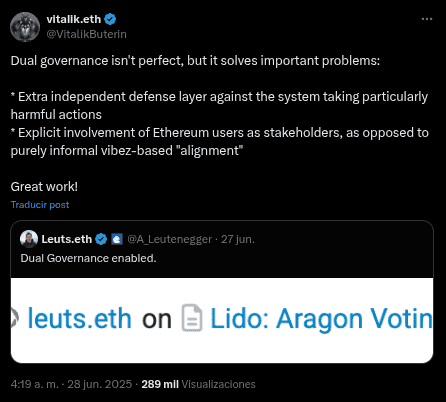
Lido DAO is taking a historic step: it has implemented a dual governance system that gives stakers real veto power over the protocol's most important decisions.
This dual governance means that, for the first time, those who deposit and lock up their ETH tokens to earn stETH not only participate in staking rewards, but can now also delay or block proposals submitted by traditional LDO token holders.
This change is no small feat; it represents a profound transformation in how power is distributed within Ethereum's largest liquid staking protocol. Until now, key decisions were left to large LDO holders, but with this update, stakers' interests are much better protected. In essence, they become a kind of "gatekeeper" of the system, capable of halting initiatives that could be detrimental to the overall well-being of the ecosystem.
BUY LIDO (LDO) ON BIT2MELido DAO's dual model: innovation and balance in Ethereum governance
Lido DAO is positioned as an undisputed player in the staking revolution within Ethereum, managing a large portion of the network's total staking. Recently, its community decided to adopt a dual governance structure, a modality that gives stakers the power to significantly influence the protocol's operational decisions. This structure allows stETH holders to delay or even veto proposals that could be detrimental to them or to the overall health of Ethereum.
The approval process for this structure showed strong support from community members. During the main phase of vote53,6 million LDO tokens were issued in favor, barely exceeding the stipulated quorum of 50 million tokens. Surprisingly, only 1,18 million tokens were voted against, coming from a single dissident user, reflecting a near-unanimous consensus that demonstrates the confidence this change generates in the community.
Vitalik Buterin, co-founder of Ethereum, highlighted in a publication in X that dual governance, although not perfect, addresses crucial problems within the ecosystem.
According to Buterin, this structure acts as an independent layer that protects against "particularly harmful actions" and allows Ethereum participants to take an active role as stakeholders in Lido.

This governance model establishes a fundamental balance between economic power and direct participation, preventing traditional LDO holders from unilaterally making decisions about the protocol's future. By granting stakers the formal ability to object to decisions, Lido strengthens both the security and internal democracy of the ecosystem.
Smart governance: more participation, more trust
The system implemented by Lido offers several key advantages. For stakers, it provides formal recognition of their crucial role in the network, creating a genuine sense of ownership. By being able to postpone proposals for further review via smart contracts, the community can actively participate in the future direction of the protocol. This mechanism fosters trust and collaboration among the various stakeholders, improving the overall resilience of the system to external or internal threats.
BUY THE LDO TOKEN HEREHowever, this progress also presents challenges. The inclusion of a veto power, while useful in avoiding hasty decisions, must be handled prudently so that it does not become an obstacle that paralyzes decision-making or is subject to abuse.
Still, the innovation Lido is embracing will have a broader impact on the crypto ecosystem, as startups and other platforms could adopt similar models, separating strategic governance from daily operations. According to experts, this could reduce user fatigue and improve efficiency, while promoting fairer and more secure administration. Furthermore, this approach will facilitate better compliance with emerging regulations, thanks to its transparency and collaboration.

Blockchain Course
Basic levelTake this course where we explain blockchain in a clear, simple and concise way so that you have a very clear idea of what this new technology consists of.
A key change for the future of DeFi
Lido's decision to implement this new governance model marks a turning point in how DeFi protocols approach voting and veto power in the decentralized ecosystem. By giving stakers a real say, it sends a clear message about the importance of balancing power, security, and participation in an environment where billions are at stake. This practice can drive greater legitimacy in the market, attracting users who value a more democratic and fair structure.
Furthermore, this dual governance could act as a proactive barrier to strict regulatory moves and unexpected changes in the crypto industry, allowing decisions to be made with broad consensus rather than under pressure from dominant minority groups.
Vitalik Buterin himself hailed this structure as a valuable layer to prevent harmful actions within the Ethereum ecosystem, reiterating its potential to strengthen the network in the long term.
Looking ahead, Lido's experience will serve as a benchmark for other projects seeking to improve their participation models, offer greater legal certainty, and promote effective and representative governance. Successful integration of these mechanisms can define the course of decentralization in high-impact protocols, increasingly democratizing power and facilitating the mass adoption of decentralized finance.
In conclusion, the implementation of dual governance in Lido DAO represents a significant step forward for true decentralization on Ethereum. By empowering stakers with veto rights, it strengthens the balance between the various interests within the ecosystem, protecting investors and increasing community trust and participation—essential elements for the maturation of the decentralized financial ecosystem.
BUY ETHEREUM ON BIT2ME


